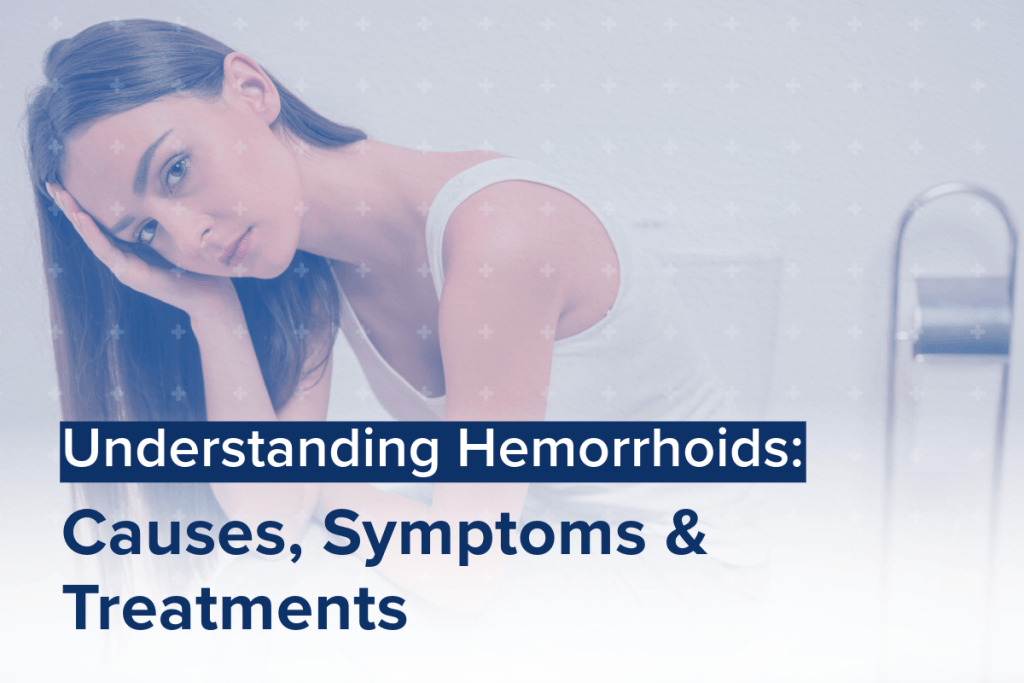Table of Contents
Schedule Your Procedure Today
- All-Inclusive Service
- Board-Certified Physicians
- Transparent Pricing
The discomfort of hemorrhoids is a common ailment. Since many regard hemorrhoids as an embarrassing condition, most persons attempt to treat them at home with over-the-counter remedies for relief from severe pain. However, it is estimated that over 3+ million people seek care each year from either their doctor, urgent care or an ER for hemorrhoid issues. Some studies estimate that perhaps 10 million in the US suffer from periodic hemorrhoid discomfort and its effect on quality of life.
This article will discuss what hemorrhoids are, what causes them, and treatment options.
What Are Hemorrhoids?
Veins exist in your lower rectum and anus. In their normal state, they help bowel control, acting as if they are cushions for the blood vessels in the anus and rectum. When those veins become swollen and irritated, they become known as hemorrhoids, which can affect the blood supply. The condition is similar to when varicose veins occur in the legs.
Hemorrhoids can be uncomfortable, itchy and can also bleed.
Types of Hemorrhoids
There are internal and external hemorrhoids.
Internal: These are within the rectum, so you are less likely to see or feel them. However, they can be a source of bleeding.
External: They exist under the skin, around the anus. They can itch, cause pain, and bleed. These hemorrhoids are the most likely to cause discomfort.
What Causes Hemorrhoids?
There are several reasons why hemorrhoids exist:
- Low-Fiber Diet: A diet that does not have enough high-fiber foods, such as fruits, vegetables, grains and nuts, can play a role. Fiber is an important ally in helping the digestive process run smoothly. A diet low in fiber can lead to the next issue.
- Straining during a bowel movement: A diet low in fiber can lead to constipation, causing a person to strain during a bathroom visit. This strain exacerbates the veins, causing them to swell.
- Pregnancy and Childbirth: The physical changes and added pressure on the rectal veins during pregnancy can contribute to the development of hemorrhoids.
- Obesity: Extra weight can cause additional stress on the rectal veins.
- Sitting: Long periods of sitting can play a role in causing hemorrhoids.
All of the factors above, either on their own or in conjunction with each other, can play a role in the development and severity of hemorrhoids.
What Are Hemorrhoid Symptoms?
Symptoms can vary depending upon if they are internal or external hemorrhoids.
Internal Hemorrhoids
- Mucus discharge from the anus.
- Feeling of incomplete evacuation: it may feel like you have not completed your bowel movement in its entirety.
- Prolapse: this is when an internal hemorrhoid slips out through the anus causing pain.
External Hemorrhoids
- Lumps: these can be seen and felt around the anus.
- Thrombosis: this is a blood clot that can cause a hard, inflamed painful lump to form.
- Itching, sensitivity and discomfort around the anus.
If you see bright red blood when you use the bathroom (possible rectal bleeding), it could be a sign of hemorrhoids. This bleeding is common with both internal and external hemorrhoids, and you might notice it on the toilet paper, in the toilet, or on your stool.
What Can Be Mistaken as a Hemorrhoid?
Certain conditions can mimic the symptoms of hemorrhoids, leading to confusion. Hemorrhoids often share symptoms with anal fissures, which are small tears in the lining of the anus that can cause pain and bleeding. Rectal polyps or even colorectal cancer may also present with symptoms like rectal bleeding or discomfort.
Additionally, other conditions such as skin tags, abscesses, or infections around the anus can resemble external hemorrhoids. To confirm the cause of your symptoms, a healthcare professional may perform a digital rectal exam to ensure an accurate diagnosis and appropriate treatment.
Treatment Options for Hemorrhoids
At-Home Remedies
There is a variety of at-home remedies that can help alleviate symptoms including:
- Increasing your fiber intake
- Staying hydrated can help prevent hemorrhoids and maintain healthy blood vessels.
- Taking a sitz bath: a sitz bath is a shallow, warm bath that allows your anal area to be soothed and cleansed by the warm water. The warm water increases blood flow which promotes healing and relaxes muscles.
Over-The-Counter Medicine
Remedies include:
- Creams & ointments: Medicines with ingredients like hydrocortisone and lidocaine relieve pain and reduce swelling.
- Suppositories: Similar to creams but inserted rectally. This remedy is intended for internal hemorrhoids.
- Wipes: They contain soothing medicines/ingredients and allow the affected area to be cleansed.
- Oral medicine: Examples include pain relievers, fiber supplements, and stool softeners.
Hemorrhoid Banding
Hemorrhoid Banding is a minimally invasive outpatient procedure used to treat internal hemorrhoids. During the procedure, a doctor inserts a small device called a ligator into the rectum. Prior to the procedure, the rectum will have been numbed by a topical anesthesia. The ligator uses a tiny rubber band to cut off circulation to the hemorrhoid. This causes the hemorrhoid to shrink and fall off in two weeks or less.
Surgery
In rare instances, a hemorrhoid may be so severe that a surgeon may need to remove it. Known as a hemorrhoidectomy, the hemorrhoid and swollen tissue is cut away and the remaining tissue is repositioned.
ColonoscopyAssist: Quality Care You Can Afford
ColonoscopyAssist is dedicated to making hemorrhoid banding, colonoscopies, and other gastrointestinal procedures accessible and affordable for those without insurance or who are self-paying. Our program supports those committed to digestive wellness by offering affordable screening and care options. Check out our Nationwide Hemorrhoid Banding Program and Book your Procedure Today!
Final Thoughts
Hemorrhoids are uncomfortable. However, you and your discomfort are not alone. As mentioned at the start of our article, nearly 10 million have occasional irritation and pain from hemorrhoids. There are numerous at-home and over-the-counter remedies that can help alleviate that ache and itch. However, if your issue is severe enough, a hemorrhoid banding may be an ideal minimally invasive way to gain relief.


















